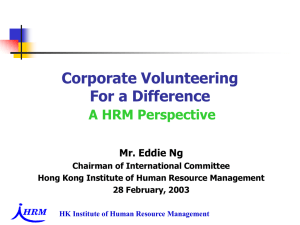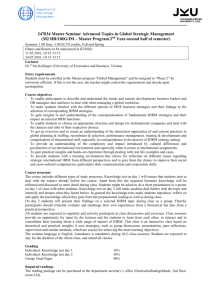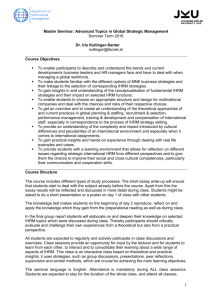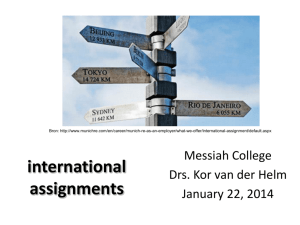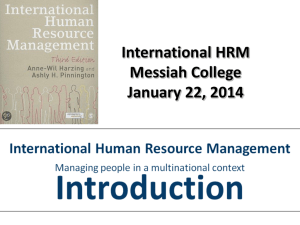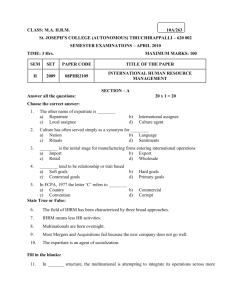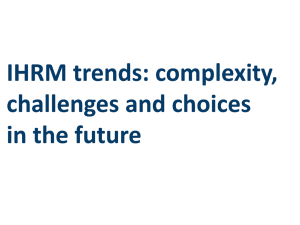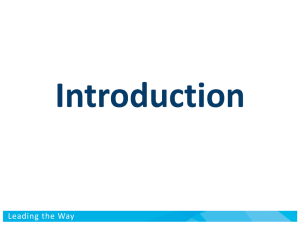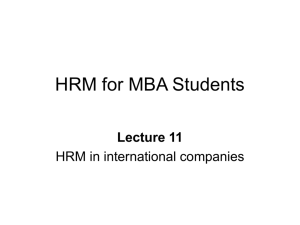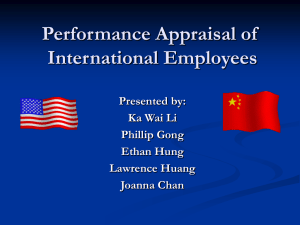5828
advertisement
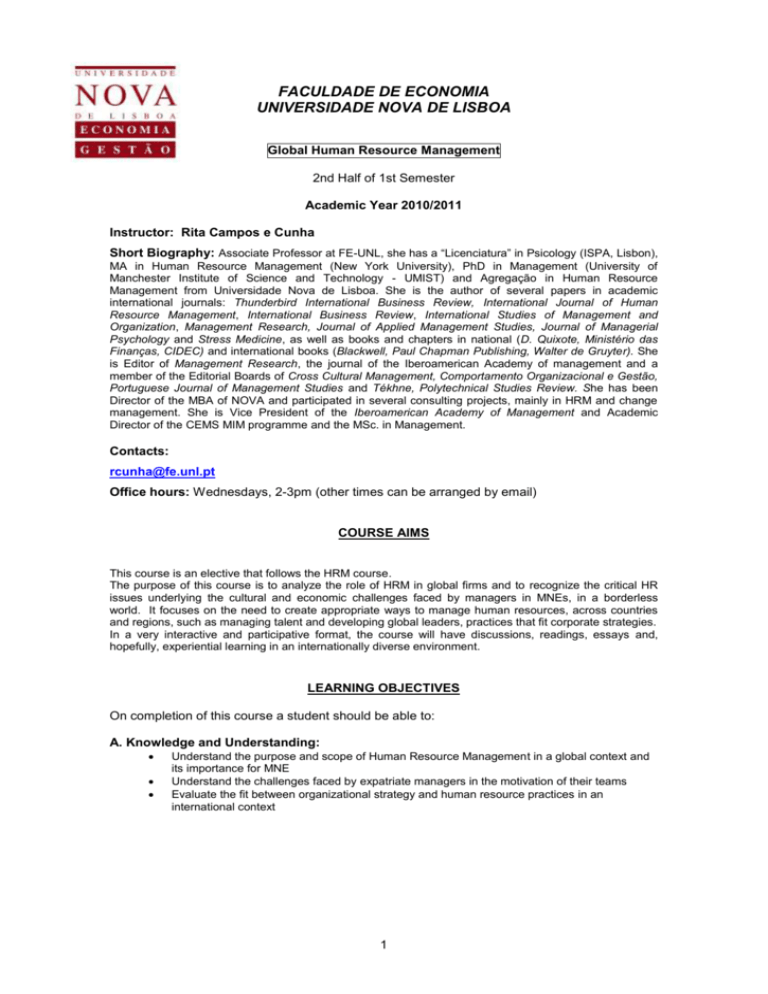
FACULDADE DE ECONOMIA UNIVERSIDADE NOVA DE LISBOA Global Human Resource Management 2nd Half of 1st Semester Academic Year 2010/2011 Instructor: Rita Campos e Cunha Short Biography: Associate Professor at FE-UNL, she has a “Licenciatura” in Psicology (ISPA, Lisbon), MA in Human Resource Management (New York University), PhD in Management (University of Manchester Institute of Science and Technology - UMIST) and Agregação in Human Resource Management from Universidade Nova de Lisboa. She is the author of several papers in academic international journals: Thunderbird International Business Review, International Journal of Human Resource Management, International Business Review, International Studies of Management and Organization, Management Research, Journal of Applied Management Studies, Journal of Managerial Psychology and Stress Medicine, as well as books and chapters in national (D. Quixote, Ministério das Finanças, CIDEC) and international books (Blackwell, Paul Chapman Publishing, Walter de Gruyter). She is Editor of Management Research, the journal of the Iberoamerican Academy of management and a member of the Editorial Boards of Cross Cultural Management, Comportamento Organizacional e Gestão, Portuguese Journal of Management Studies and Tékhne, Polytechnical Studies Review. She has been Director of the MBA of NOVA and participated in several consulting projects, mainly in HRM and change management. She is Vice President of the Iberoamerican Academy of Management and Academic Director of the CEMS MIM programme and the MSc. in Management. Contacts: rcunha@fe.unl.pt Office hours: Wednesdays, 2-3pm (other times can be arranged by email) COURSE AIMS This course is an elective that follows the HRM course. The purpose of this course is to analyze the role of HRM in global firms and to recognize the critical HR issues underlying the cultural and economic challenges faced by managers in MNEs, in a borderless world. It focuses on the need to create appropriate ways to manage human resources, across countries and regions, such as managing talent and developing global leaders, practices that fit corporate strategies. In a very interactive and participative format, the course will have discussions, readings, essays and, hopefully, experiential learning in an internationally diverse environment. LEARNING OBJECTIVES On completion of this course a student should be able to: A. Knowledge and Understanding: Understand the purpose and scope of Human Resource Management in a global context and its importance for MNE Understand the challenges faced by expatriate managers in the motivation of their teams Evaluate the fit between organizational strategy and human resource practices in an international context 1 Subject-Specific Skills: Specific techniques for global human resource management Cross-cultural Interpersonal relations C. General Skills: Communication (written, verbal and graphical) Team work Analytical skills TEACHING AND LEARNING METHODS A variety of teaching and learning methods will be used in this course: lectures and case study discussions, as well as presentations on group work. ASSESSMENT Group report on 1 case study (5 pages max.) Individual report (2 pages max) Group term paper (12 pages max) Individual Exam 20% 20% 30% 30% Grading scale in this course is 0-20. Case study reports: Each group must do 1 case study report for evaluation, from the list of 3 case studies that will be discussed in class, marked in bold. The groups will be randomly attributed their case study for evaluation. A report of 5 pages (max) is expected. For the other two case studies, groups must only present an executive summary of main issues (around 2 pages) and be prepared to discuss it in class. Individual report: Students will receive three topics by email. You need to choose one and write an individual report to be sent by email. Topics will be assigned on a Friday, to be delivered the following Sunday.This report is up to 2 pages long (max) and should reflect not only your knowledge on the theme but also your individual opinion. Group term paper: First, the group must select a company. You may either choose an SME or a big and global one. Whatever you choose, it must be multinational or, at least, internationalizing. Describe the company (4/5 pages) focusing on the HR issues the company faces in the global context, or, if you don’t have access to the real ones, find out about HR best practices of a company in this industry. Select one new country for this company to enter, preferably one covered by Hofstede’s study. Consider the best option to international expansion for that company: IJV, M&A or new subsidiary and describe the IHRM challenges for the chosen option on internationalization. Reference should be made to national culture issues and other contextual factors that will affect your decision. On the whole, your report should be about 10 pages long, 12 pages being maximum length. You may use several distinct information sources, from books and papers to websites. Make a reference to those sources, in your report. Paper to be delivered and presented on the last day of class. Individual exam: Exam will be based on a case study that will be given to you one week before the exam. Passing in this course requires a minimum grade of 10 in the final exam. 2 COURSE CONTENT TOPICS Sessions 1 Bibliography Introduction to the course and to the assignments; Introduction to GHRM. (D,F&E) 1, 2 (J,T&B) ; (M&DS) Global leadership and team development. National cultures. Convergence vs. Divergence in IHRM. Discussion of a case study (this case study will be given in class). 2 Alliances, Cross-border Mergers and Acquisitions (D,F&E) 3, 4, 5 Role of HRM in MNC strategy. (R,W&H) ; (F,S&S) Discussion of case study (for evaluation) Global Staffing: HR Planning, Recruitment and Selection 3 4 5 6 Discussion of case study (for evaluation) (D,F&E) 6, 11 Performance Management. Global workforce training and development. (NA) ; (O,M&R) Discussion of case study (for evaluation) (D,F&E) 8 Managing international assignments. Re-entry and career issues. (B&G) ; (JO) Discussion of individual report (D,F&E) 7 International compensation. (NK) Presentation of group term papers. (G,D&T) Course wrap-up. 3 BIBLIOGRAPHY (D,F&E) Dowling, P.; Festing, M. & Engle, A. (2008) “International Human Resource Management, Managing People in a Multinational Context”, fifth edition, Thomson Learning, London, UK. (J,T&B) Javidan, Teagarden & Bowen (2010) “Making it overseas”, Harvard Business Review, April, 109-13. (M&DS) Maznevski & DiStefano (2000) “Global Leaders are team players: Developing global leaders through membership on global teams”, Human Resource Management, 39 (2&3): 195-208. (G,D&T) Von Glinow, MA, Drost, E. &B Teagarden, M (2002) “Converging on IHRM best practices: Lessons learned from a globally distributed consortium on theory and practice”, Human Resource Management, Vol.41(1): 123-40. (F,S&S) Farndale, Scullion & Sparrow (2010) “The role of the corporate HR function in global talent management”, Journal of World Business, 45: 162-168. (R,W&H) Ryan, AM, Wiechmann, D & Hemingway, M. (2003) “Designing and Implementing Global Staffing Systems: Part II-Best Practices”, Human Resource Management, Vol. 42(1): 85-94. (NA) Adler, Nancy (1987) “Pacific Basin Managers: A Gaijin, not a woman”, Human Resource Management, 26(2): 169-91. (O,M&R)Oddou, Mendenhall & Ritchie (2000) “Leveraging Travel as a tool for global Leadership Development”, Human Resource Management, 39(2&3):159-72. (B&G) Black, JS & Gregersen, HB (1999) “The right way to manage expats”, Harvard Business Review, March-April (JO) Osland, J. (2000) “The journey inward: expatriate hero tales and paradoxes”, Human Resource Management, Vol.39 (2&3): 227-38 (NK) Krupp, N. (2002) “Global Compensation Planning – Establishing and maintaining a competitive edge in the international marketplace”, Compensation and Benefits Management, Spring: 54-56. RESOURCES Lecture slides and case studies will be provided. 4
